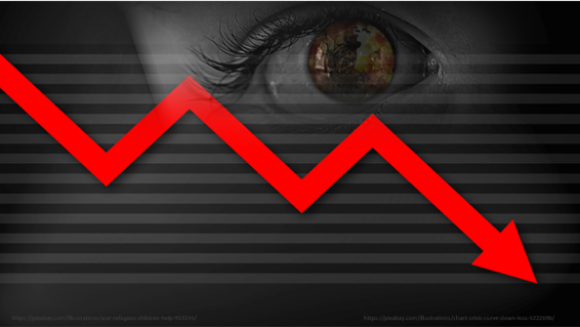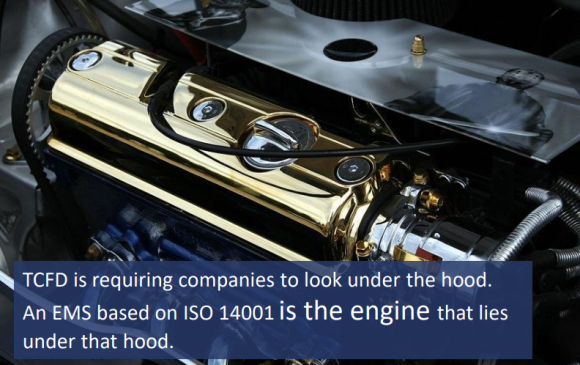Whether or not the science is accepted, environmental risks, particularly climate risks, are creating angst in society and instability in financial systems.
Climate change presents physical, social and financial risks that challenge all of humanity.
“Are You Climate Ready?” enables organizations to address these risks and offers opportunity.
Mark Carney, former Governor of the Bank of England, explained that “it is the ‘power of money’ that will ultimately play the biggest role in combating climate change”. “Companies that don’t adapt will go bankrupt without question.”
“Are You Climate Ready?” offers investors, companies, and governments a practical systems approach to managing risk.
It enables better compliance for those who are supporters of the Task Force on Climate-related Financial Disclosures (TCFD), or for those organizations that operate in jurisdictions that have mandated reporting, based on the TCFD. There’s more …
Being climate ready is business critical
Researchers from around the world tell us that fundamental shifts have occurred in our climate. Earth’s average temperature has risen more than 2 degrees Fahrenheit since the 1880s. While this does not sound like much, there are consequences with a warmer planet. However, there are unintended consequences that we are still learning about. These changes are causing instability in the environment that manifest in extreme weather events and natural disasters.
Uncertainty fosters instability in our social and financial systems.

“Are You Climate Ready?” is critical to your success
Reporting on its own falls perilously short of repositioning the financial systems. People need to make better decisions and enable the interactions necessary to drive change. “Are You Climate Ready?” offers a systems approach to accelerate this change, enabling a better understanding of the dependency all organizations have on the environment.
Working together will accelerate actions and enhance interactions to lower risk and drive opportunity.
Learn how a systems-based approach can help your organization become climate ready.

“Are You Climate Ready?” fills a vacuum
Financial markets need clear, comprehensive, high quality information on the effects of climate change. The Task Force on Climate related Financial Disclosures (TCFD) was tasked to recommend more effective climate related disclosures to increase and improve reporting. The intent was to promote more informed investment, credit, and insurance underwriting decisions. These, in turn, enable stakeholders to understand better the concentrations of carbon related assets in the financial sector and the financial system’s exposures to climate related risks.
Reporting against the TCFD started as a voluntary reporting process, and for most countries, it still is. But that is changing. New Zealand, followed by the UK have led the shift to mandatory reporting. Europe’s Green Deal will demand reporting for stakeholders within the European Union and those that wish to export to the EU.
Financial institutions are being pushed to address climate change. Consider the drive for commitments to Net Zero, the G20’s Sustainable Finance Working Group intent to address fragmentation in reporting systems, and with the most recent, dire alert by the International Panel on Climate Change (IPCC), no one can mistake the need for critical transparent and trustworthy disclosures.
Being climate ready is not just about reporting.

About the Collaboration and its
raison d’être
The Collaboration is an informal cross-sector group of organizations, representing largely private sector interests. It is the core of a larger cross-sector group called G16. The team of experts coordinating the engagement process have a lengthy history in the development and negotiation of ISO standards, some with 28 years of experience in ISO 14001 and related international standards.
G16’s mandate was to provide user insight into the third revision of an international standard for environmental management systems (EMS), ISO 14001. There was nothing special about the name G16. It involved 16 different business sectors, which originally met on the 16th floor in a law office.
When the standard was republished in 2015, members of The Collaboration focused on making their transition, and seeking opportunities to improve their environmental performance.
Why do we favour a strategic, systemic management approach?
All life forms, all human activities, products, and services involve processes that are based in systems. The inherent weakness in how we react is that our systems fail to recognize our role in these systems and address unintended consequences. If you are interested in understanding why systems thinking is so important, we recommend you watch this brief explanation by Professor John Sterman.

Why did we develop
“Are You Climate Ready?”
AYCR was borne out of the challenge members set for themselves to explore the value proposition for their EMS. The Collaboration had been tracking some of the initiatives in the financial community as part of an ongoing search for innovations and new initiatives.
We discovered the Task Force on Climate-related Financial Disclosures (TCFD) shortly after it was published. As it was an initiative of the Financial Stability Board (FSB), a kingmaker of global financial rules, we believed that it was going to evolve into a driver of external reporting and a mandatory reporting mechanism. New Zealand was the first country to prove our thinking correct.
As for being a driver of external reporting? While the TCFD started with just a hundred and one Supporters, that number has grown steadily, along with the value of assets under management. In a news release by CERES on September 30, 2021, they noted that more than 2,000 companies, including financial firms managing more than $138 trillion in assets support it, making it the leading international standard for climate reporting across industries, including insurance.
TCFD is requiring companies to look under the hood.
An EMS based on ISO 14001 is the engine that lies under that hood.
An engine needs other parts to transfer the power of the engine into motion. And so, AYCR evolved into a system.



